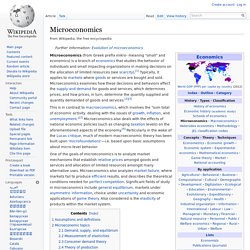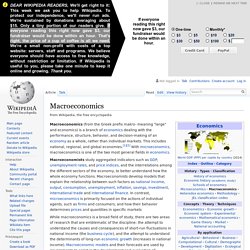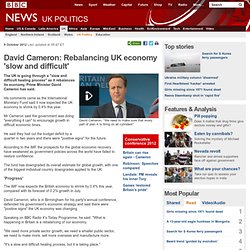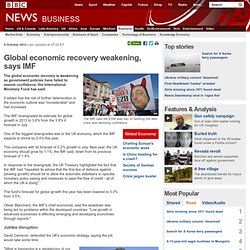

Microeconomics. This is in contrast to macroeconomics, which involves the "sum total of economic activity, dealing with the issues of growth, inflation, and unemployment.

"[2] Microeconomics also deals with the effects of national economic policies (such as changing taxation levels) on the aforementioned aspects of the economy.[4] Particularly in the wake of the Lucas critique, much of modern macroeconomic theory has been built upon 'microfoundations'—i.e. based upon basic assumptions about micro-level behavior. Assumptions and definitions[edit] Microeconomic theory progresses by defining a competitive budget set which is a subset of the consumption set. It as at this point that economists make the technical assumption that preferences are locally non-satiated. The utility maximization problem is the heart of consumer theory. The utility maximization problem is a simple constrained optimization problem in which an individual seeks to maximize utility subject to a budget constraint.
Monopoly[edit] Macroeconomics. Circulation in macroeconomics.

Macroeconomics (from the Greek prefix makro- meaning "large" and economics) is a branch of economics dealing with the performance, structure, behavior, and decision-making of an economy as a whole, rather than individual markets. This includes national, regional, and global economies.[1][2] With microeconomics, macroeconomics is one of the two most general fields in economics. While macroeconomics is a broad field of study, there are two areas of research that are emblematic of the discipline: the attempt to understand the causes and consequences of short-run fluctuations in national income (the business cycle), and the attempt to understand the determinants of long-run economic growth (increases in national income). Macroeconomic models and their forecasts are used by governments to assist in the development and evaluation of economic policy.
Basic macroeconomic concepts[edit] Output and income[edit] Unemployment[edit] Main article: Unemployment IS–LM[edit] 1. David Cameron: Rebalancing UK economy 'slow and difficult' 9 October 2012Last updated at 05:47 ET David Cameron: "We need to make sure that every part of plan A is firing on all cylinders" The UK is going through a "slow and difficult healing process" as it rebalances its economy, Prime Minister David Cameron has said.

His comments came as the International Monetary Fund said it now expected the UK economy to shrink by 0.4% this year. Mr Cameron said the government was doing "everything it can" to encourage growth in difficult economic times. He said they had cut the budget deficit by a quarter in two years and there were "positive signs" for the future. According to the IMF the prospects for the global economic recovery have weakened as government policies across the world have failed to restore confidence. The fund has downgraded its overall estimate for global growth, with one of the biggest individual country downgrades applied to the UK. 'Progress' "It's a slow and difficult healing process, but it is taking place. " Global economic recovery weakening , says IMF. 9 October 2012Last updated at 07:22 ET The IMF said the ESM was key to tackling the debt crisis and restoring confidence The global economic recovery is weakening as government policies have failed to restore confidence, the International Monetary Fund has said.

It added that the risk of further deterioration in the economic outlook was "considerable" and had increased. The IMF downgraded its estimate for global growth in 2013 to 3.6% from the 3.9% it forecast in July. One of the biggest downgrades was to the UK economy, which the IMF expects to shrink by 0.4% this year. This compares with its forecast of 0.2% growth in July. In response to the downgrade, the UK Treasury highlighted the fact that the IMF had "repeated its advice that the first line of defence against [slowing growth] should be to allow the automatic stabilisers to operate, monetary policy easing and measures to ease the flow of credit - all of which the UK is doing". Jubilee disruption "But it is a slow process. " Greater union.